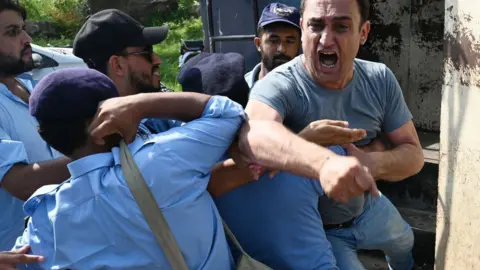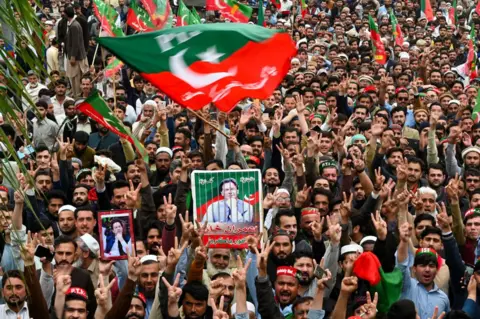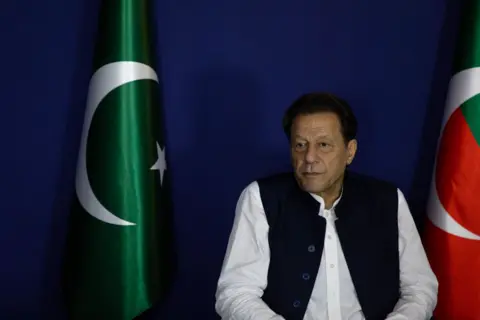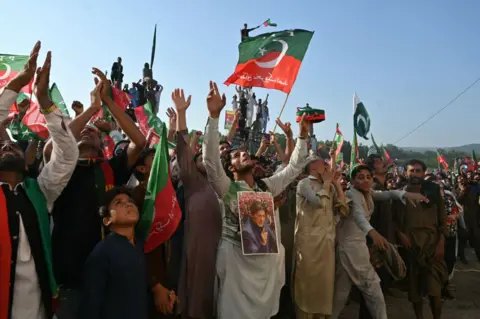'Undemocratic overkill' in Pakistan as Imran Khan's followers push to free him
 Getty Images
Getty ImagesFor weeks, the roads around Islamabad have been lined by shipping containers; road blocks ready for immediate deployment in the event of any protest.
Pakistan’s capital has become used to entire areas being sealed off whenever the authorities get an inkling that unrest could be brewing. It is a constant reminder to the city’s residents that at any moment, everything could tip.
Last Sunday, the containers were out in force, blocking 29 routes around the city.
In a much-publicised and anticipated political rally, Imran Khan’s Pakistan Tehreek-e-Insaf (PTI) supporters made their way in their thousands towards Islamabad. The crowd waved flags and banners while a poster of the former prime minister suspended by balloons gently floated overhead. Others wore eerie masks of Imran Khan’s face. Chants of "Imran Khan Zindabad" (long live Imran Khan) echoed around the venue.
The containers did not contain them; video on social media shows lines of supporters shoving the corrugated metal aside and surging through to reach the rally’s venue.
The man whose face was everywhere was not in attendance. Imran Khan has been behind bars for more than a year, having been convicted of corruption and charged with leaking state secrets.
Mr Khan has called all the charges against him politically motivated. But despite seeing his sentences overturned and a UN working group declaring that he had been "arbitrarily detained", there seems little movement toward his release. Most analysts say that without the explicit say-so from Pakistan’s politically powerful military, Mr Khan will not be let out.
That didn’t stop the political promises from PTI leaders on Sunday.
"Listen Pakistanis, if in one to two weeks Imran will not be released legally, then I swear to God we will release Imran Khan ourselves," the chief minister of Khyber Pakhtunkhwa, Ali Amin Gandapur, bellowed from the stage. "Are you ready?"
 Getty Images
Getty ImagesThe crackdown
The reaction came quickly.
On the following evening, word began to spread on social media and TV news channels that the crackdown had begun. Footage from Pakistan’s parliament showed the party’s chairman and MP Gohar Ali Khan being marched out of the building, his arms held firmly by police, cameras and mobile phones hovering in a swarm around him.
CCTV footage reportedly filmed inside the office of Shoaib Shaheen, another National Assembly member, showed him being quickly bustled out of the room as men streamed through several doors.
Confusion about exactly who had been arrested pinged around WhatsApp groups. Even by the morning after, the police had only confirmed three arrests to the BBC, while the PTI said the number was higher than 10. Mr Gohar was later released, but several others remained in police custody.
The assumption from the start was that these arrests had been made under a new law, introduced only last week and labelled by Amnesty International’s spokesperson as "another attack on the right to freedom of peaceful assembly". The Peaceful Assembly and Public Order Act 2024 act restricts public gatherings and proposes three-year jail terms for participants of "illegal" assemblies, with 10-year imprisonment for repeat offenders.
While the PTI had received permission to hold their rally, the police had already complained that it had run past the designated cut-off time and therefore caused a "serious law and order situation".
Cat and mouse
The crackdowns mark the latest phase in a long game of cat and mouse between Imran Khan’s PTI and the authorities. So what does this power struggle mean for Pakistan?
"At best this is a dangerous distraction," says Michael Kugelman, director of the South Asia Institute at the Wilson Centre think tank in Washington. "But at worst, it could be something that destabilises the country even more. It makes it all the more difficult to address Pakistan’s economic and security challenges."
Pakistan is still trying to stabilise its economy and has seen an increasing number of militant attacks.
Mr Kugelman argues that Pakistan’s military, thought to be the driving force behind the crackdown on PTI, are trying to contend with a changing world.
"For many years the army has had its way with dissent. It’s been able to snuff it out through crackdowns," he said. "But what’s different with Pakistan and the world [now] is that this is the social media era. The PTI has been able to master the art of social media to advance political goals."
 Getty Images
Getty ImagesMr Kugelman described this as a "very concerning" development from the military's perspective, and said it's not surprising that it would resort to methods which "might seem like overkill and certainly are, not to mention wholly undemocratic."
"This is a military reacting to a political threat it’s not used to," he said.
Beyond the introduction of the illegal assembly law and the arrests of lawmakers from parliament, the Pakistani government has also been criticised by digital rights campaigners for limiting online activities.
Since the February elections, social media platform X, formerly known as Twitter, has not worked in Pakistan without a VPN. The military has repeatedly talked about the dangers of "cyber terrorism", and the government recently said that it was creating an online firewall. When questioned about how the firewall might limit freedom of speech, a minister said "it would not curb anything".
Many see this as an attempt to try to limit PTI’s social media machine, including the reach of the party's supporters based outside the country who regularly criticise the military online.
A hybrid regime
The longer these clashes continue, the worse some fear it could be for Pakistan. As Mehmal Sarfraz, a Lahore-based political commentator and journalist, puts it: “When political parties fight, a third force takes advantage."
For many analysts, that third force is Pakistan’s military which has long been closely tied to the country’s politics. The degree to which the military has allowed civilian governments to make decisions has waxed and waned. Today many analysts see the military’s hand in many political decisions and restrictions.
“Unless political parties talk to one another, this hybrid regime will continue to gain strength,” says Ms Safraz. “The hybrid could then become more permanent.”
 Getty Images
Getty ImagesImran Khan has made it clear, however, that he and his party have no interest in speaking to the other political parties.
The PTI is consistently popular and able to mobilise, and seems unbowed by the pressure. But despite party members' success keeping their leader’s name in the headlines, they can’t get him out from behind bars.
Rather than coming to a compromise, the recent rally and heated speeches suggest that they remain confrontational. And that could have ramifications for both their political and legal positions; Imran Khan is still fighting to avoid being tried in a military court.
The military remain resolute, too. The more the PTI seems to push, the more barriers the military seems to find to put in its way.
The fear for some, however, is that once these new measures are rolled out it will be hard to roll them back.
“The danger is that we become less of a democracy, more of a hybrid with every passing day,” says Ms Sarfraz.
For now, the shipping containers still sit on the sides of Islamabad’s streets.
